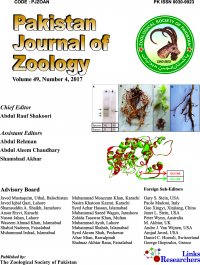Mutational and Evolutionary Analysis of Interleukin-2 Gene in Pakistani Goat Breeds
Mutational and Evolutionary Analysis of Interleukin-2 Gene in Pakistani Goat Breeds
Tanveer Hussain1, Abdul Wajid1, Jabbar Khan2, Asif Nadeem1, Misbah Hussain1, Qurat ul-Ain1 and Masroor Babar1*
ABSTRACT
Interleukin 2 (IL-2) is produced by activated T cells and play important role in immune response against antigen. It acts in both autocrine and paracrine manner. It can stimulate B cells and various other phagocytic cells like monocytes, lymphokine-activated killer cells and natural killer cells. Acting in autocrine fashion, IL-2 protein plays a crucial role in proliferation of T cells. IL-2 triggers the release of pro and anti- inflammatory cytokines by activating several pathways. In present study, exon 1 of IL-2 gene of four local Pakistani breeds (Dera Din Panah, Beetal, Nachi and Kamori) was amplified by using reported ovine IL-2 primers. Amplified products of 4 breeds of goat were bidirectionally sequenced to decipher polymorphisms. Only a single substitution (T→A) was found in non-coding region of IL-2 gene. Comparison of IL-2 gene sequence of all four breeds with other goat breeds showed high similarity in sequence. Phylogenetic analysis of our local breeds with other mammals showed that IL-2 was highly variable. This high substitution rate could be due to changed selective pressure. These rapid changes may also lead to the changes in the functions of immune system.
To share on other social networks, click on any share button. What are these?










